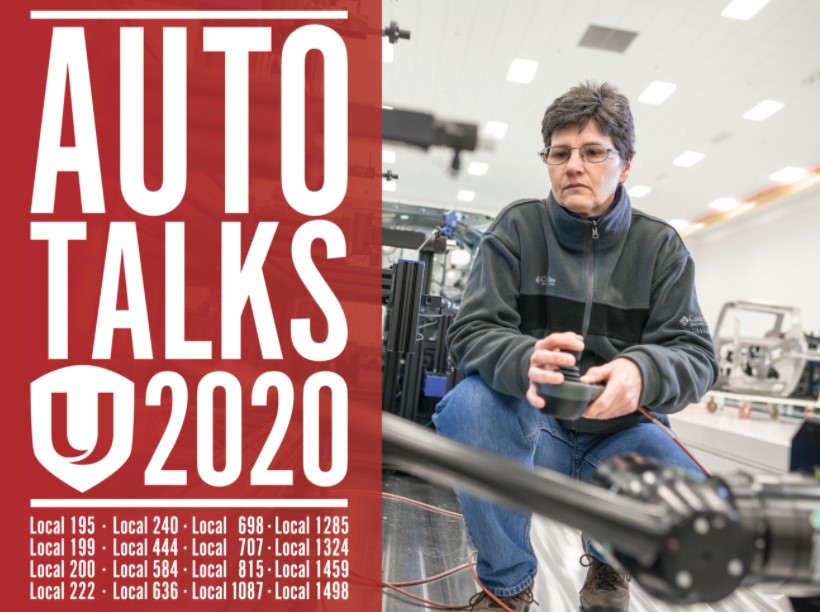August 17, 2020
Bargaining Update #2
Unifor Members
On Wednesday August 12, our union formally opened negotiations with each of the Detroit Three automakers. Three separate meetings took place in downtown Toronto over the course of the day between representatives of Unifor’s master bargaining committees, including National President Jerry Dias, and company officials from General Motors, Ford, and Fiat Chrysler. Meeting participants followed strict health and safety protocols, including safe physical distancing and the use of protective masks.
This formal opening of talks is a long-standing part of contract negotiations in the Canadian auto sector. No actual bargaining takes place between the union and company at this time. Rather, it is an opportunity for lead negotiators to exchange opening statements that signal, to each side, the priority objectives and expectations heading into talks. It is an opportunity for committee members to meet and a chance for the union to communicate its views with the news media and answer questions journalists may have.
Bargaining Priorities
In recent months, Unifor members at each of the Detroit Three submitted ideas and proposals for amending and improving our current collective agreements. The union bargaining committees received hundreds of recommendations from members over this time. The committee reviewed these proposals and organized them into a package submitted, on behalf of the members, to the company. These proposals include so-called “master bargaining” issues such as wages, pensions and benefits – issues that apply in equal measure across the facilities. The proposals also include “local bargaining” issues. These are issues distinct to each individual facility, such as job assignments, union representation and facility upgrades, for example (see below for further explanation on the multi-layered bargaining committee structure).
In our opening remarks, the union outlined its core priorities, derived from the various membership proposals as well as views of the elected bargaining committee representatives and the Unifor Auto Council.
A top priority for the union is securing existing products and seeking commitments for new product allocation and investment at each of our facilities. Unifor representatives outlined, to each of the companies, concerns about the need for current and future product to sustain and grow our facilities.
Despite notable challenges facing the Canadian auto sector, the union believes each of these facilities is viable and, with strategic investments, well equipped for growth in the coming years. The union also signalled its intent to discuss investments in vehicle electrification, to capture a meaningful share of what will be a significant growth market in the years ahead.
In addition to securing new product programs, the union outlined its desire to improve on wages, pensions and address serious concerns with the New Hire Program (we will provide further details on the New Hire Program in our next update). The union also discussed improving health care and other fringe benefits.
At the same time, each of the companies signalled their own objectives for bargaining to the union, focusing on cost competitiveness and flexible operations.
Understanding the multi-layered bargaining committee structure
You will often hear reference to “the bargaining committee” over the course of 2020 Auto Talks. This committee comprises the designated elected workplace representatives responsible for negotiating a renewal to your collective agreement, along with National Union officials and staff.
However, it is important to understand that there are different types of bargaining committees at work in auto talks, each with different responsibilities. For starters, a local bargaining committee is responsible for negotiating matters relevant to each individual facility, including various operational and personnel matters. Bargaining between Unifor’s local committees and facility management, in some cases, has been ongoing for weeks, and will continue in the weeks ahead. These will take place in parallel with meetings of the so-called “master bargaining” committee.
The master bargaining committee is responsible for negotiating matters that cut across each of the facilities, including on issues such as wages, pensions, benefits, income security, time off (both paid and unpaid), equity, skilled trades and apprenticeships, among others. The master committee consists of select representatives from various facilities, as well as the National President, National Secretary-Treasurer, other select national union officers and staff. Each of the three companies has its own master committee.
The issues that the master bargaining committee deals with are extensive. As a result, the master committee is broken down into various sub-committees that are responsible for negotiating on a specific category of issues. The descriptions for these sub-committees vary across each of the companies, but typically include the Economic Review Committee as well as committees on Pensions and Benefits, Skilled Trades, Health and Safety and Employee Family Assistance.
Over time, the union has developed a comprehensive communication and information-sharing process so that all committees understand what is happening at different negotiating tables. All committees
work in close coordination, and report regularly on progress to the Master Bargaining Committee Chairperson through internal caucus meetings.
Next Steps
Now that the formal kick-off is complete, preliminary meetings between Unifor’s Economic Review Committee and employer representatives will commence on Monday August 24 in Toronto. Full master committee bargaining will take place with each of the three companies on Monday August 31, along with sub-committee talks, and will continue until Labour Day. At that point, National President Jerry Dias will determine which of the three companies will serve as the strike target.
Once selected, bargaining will continue solely with the strike target company (or multiple companies) until the contract expires at September 21 at 11:59 p.m.
In preparation for a potential work stoppage, the union will conduct strike votes in advance of the contract expiry date. Stay tuned for specific information pertaining to strike votes in a future update.
Members who have questions about any of the content on this site can email us at autotalks2020@unifor.org. All other collective bargaining questions should be first directed to your appropriate local union representative.
LINKS

